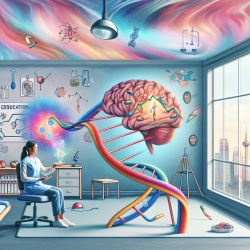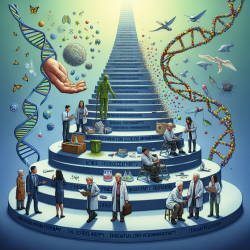Introduction
As a practitioner in the field of special education and therapy, staying updated with the latest research is crucial for providing the best care to your students. A recent study titled "A postzygotic de novo NCDN mutation identified in a sporadic FTLD patient results in neurochondrin haploinsufficiency and altered FUS granule dynamics" has shed light on a novel genetic mutation that could have significant implications for understanding and treating neurodegenerative disorders.
Understanding the Research
The study focuses on a rare de novo mutation in the NCDN gene, which encodes the protein Neurochondrin (NCDN). This mutation was identified in a patient with frontotemporal lobar degeneration (FTLD), a subtype of frontotemporal dementia (FTD). The mutation leads to NCDN haploinsufficiency, resulting in altered FUS granule dynamics in neurons.
The research highlights a negative feedback loop between NCDN and the RNA-binding protein FUS, where loss of NCDN affects FUS cytoplasmic dynamics, and in turn, impacts NCDN expression. This finding is crucial as it suggests that NCDN and FUS are part of a common regulatory pathway involved in maintaining synaptic homeostasis.
Implications for Therapy Practice
For practitioners, understanding the role of genetic mutations in neurodegenerative diseases can enhance therapeutic strategies. Here are some ways to implement the outcomes of this research in your practice:
- Genetic Awareness: Encourage genetic testing and counseling for patients with unexplained neurodegenerative symptoms. Early identification of genetic mutations can lead to more targeted interventions.
- Personalized Therapy: Use the knowledge of NCDN and FUS interactions to develop personalized therapy plans. Understanding the molecular pathways involved can help tailor interventions to the specific needs of each student.
- Research Collaboration: Collaborate with researchers to explore further the therapeutic potential of targeting NCDN and FUS pathways. This could lead to the development of novel therapies for neurodegenerative disorders.
Encouraging Further Research
The findings of this study open new avenues for research in the field of neurodegeneration. Practitioners can play a vital role in advancing this research by:
- Participating in Clinical Trials: Encourage participation in clinical trials that explore genetic therapies targeting NCDN and FUS pathways.
- Sharing Clinical Observations: Share clinical observations and outcomes with researchers to help refine and validate therapeutic approaches.
- Advocating for Funding: Advocate for funding and resources to support research into genetic therapies for neurodegenerative diseases.
Conclusion
The discovery of the NCDN mutation and its impact on FUS granule dynamics offers exciting possibilities for understanding and treating neurodegenerative disorders. By integrating these findings into your practice and encouraging further research, you can contribute to the development of innovative therapies that improve the lives of your students.
To read the original research paper, please follow this link: A postzygotic de novo NCDN mutation identified in a sporadic FTLD patient results in neurochondrin haploinsufficiency and altered FUS granule dynamics.










